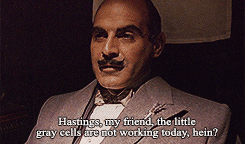Imagine you’re in the middle of a murder investigation. One of your relatives has been poisoned to death. The First World War is on, and you’re a young woman living with her aunt in a country manor in Essex. Suddenly, as you struggle to come to terms with having to suspect everyone you know of a heinous crime like murder, you’re asked a question.
“Will you marry me?”
This is, as you must have guessed, the plot of an Agatha Christie novel. Narrated here from the point of view of one of the many women Colonel Hastings has hastily proposed to…in the middle of a murder investigation. I was struck by his temerity when I read “The Mysterious Affairs at Styles” this week. It only takes him a few minutes of conversation with an auburn-haired woman called Cynthia, before he thinks himself to be in love, and pops the question. It’s not the first time Colonel Hastings does this too. Out of the eight Hercule Poirot novels he has appeared; he’s almost always falling in love. Again, in the middle of the gloom and doom of a murder investigation.

He’s focusing on a proposal, Mr. Poirot.
“So what if we’re investigating a murder? I can find the love of my life anywhere!” seems a curiously optimistic sentiment, as we collectively struggle to deal with the disaster that is 2020. Hastings’s hasty proposal made me laugh when I first read it. But maybe there’s a lesson there.
On how to not let external circumstances (in Hastings case, murder; in our case, a tanking economy and general end-of the-world sense of doom) affect the possibility of good things happening to us. Maybe we too, can find love in a pandemic-ridden world. Maybe we too, can get a good job, even if everyone we know is losing theirs. Maybe we too, can hope for an informed public and an accountable government, even if democracy as we know it is slowly being eroded every day. Cue Colonel Hastings in India circa 2020, looking around, giving up, and punching a wall in frustration.

You and me both, Hastings. You and me, both.
Feeling like punching a wall is also how we left Archana in the second part of a three-part story about a song on Vividh Bharati, and three women. You can read the earlier parts here and here, in that order.
What follows below is a continuation of that story. If you only come to this newsletter for the fantastic (if I say so myself) links I send you, scroll below the story for them.
Vividh Bharati
“Yeh geet ki farmaiyish ki hai Akola, Maharashtra se Archana ne...."
Archana slowly leaned away from the mic, gently pushed up the dials, and her voice faded away from her small studio – and was replaced by music on the radio stations of the hundreds listening to her.
“Who is she?” she asked Kabir as he poked his head in to ask if she wanted coffee.
“You haven’t heard of Geeta Dutt? What kind of RJ are you?”
“Shut up. And yes, I want a cup. But from your stash. Aaj Nescafe waali nahin.”
She took out her phone, and immediately saw a notification popped up. “Archana! Have news! Call me! Love you!” Years of friendship with Mita meant that Archana could decipher her best friend’s life developments through punctuation. All those exclamation marks could mean only thing.
Mita had said yes.
Archana wanted to punch a wall.
She was now officially the Last Unmarried Friend.
“Omg! Congratulations yaara. In studio rn, ttyl,” she typed, and hit “Send.” Then, before she could stop herself, her fingers tapped on the Instagram icon, tapped on the last story she posted (a black and white photo of her studio, “Monday blues”) and scrolled through the smiling circles of her friends and acquaintances to look for His name. She wanted to know whether He had “seen” her story.
Modern love has reframed the ritual of the pigeon who carried messages between lovers, to a peacocking on social media by two people who might be interested in each other (don’t utter the “L” word unless you want people to think you’re mad) and use social media to “signal” interest. It’s a maddening courtship, often making little sense to those who might just tap through Instagram out of a sense of boredom.
For Archana though, it was the site of a natural mating dance. She wanted Him to think of her as a “cool girl” – juggling work, friends, and a fulfilling hobby. She wanted to be relatable, but not too much. Serious about the state of the world, but also be someone who can crack a joke about herself. Smart, but not in a threatening way. It didn’t matter that she was far from these things in real-life – she barely had any time for a hobby, she overthought even a wise crack from friends, and despite all her news apps, she struggled to keep up with what’s happening. (“Every other day, there’s some nonsense yaar.”)
But it didn’t really matter. As long as He thought she was all of these things. But of course, He had not seen the story.
“Aargh. Why does nothing, ever, go my way?”
The empty studio had no wise retort. “Okay, not nothing.” She did love her job – it was fun, it allowed her to talk to people, and she was good at it. But, as Archana couldn’t help but think, she wasn’t married.
“I know it’s not cool to say this, but Mita, I really just want to get married.” They were at their favourite restaurant, and Mita was narrating the horrors of being paraded around in the Arranged Marriage Market. A talented copywriter, and the most sarcastic person Archana had ever met, Mita treated the whole marriage question with unbelievable zen-ness. Her this-is-inevitable-might-as-well-get-material attitude baffled Archana. For her, the question of “Who she will marry?” was her favourite one. With changing suitors every month. And with each guy, she would rearrange her Pinterest board with lehenga trends, (Parsi gara sari once, for Feroz, before he left for Australia), venue choices (intimate weddings at home in, Udaipur out) and best wedding videos. She had a bookmarked folder with latest articles on which Indian city is the best to settle in for a newly-wed couple, and which is the best to raise a child in. She wanted to live her life with someone she loved, wanted to be a couple instead of living through life as a single woman, wanted it more than ever. And the dream had come true – but for Mita. Who had miraculously found Rohit, an as-decent-as-they-come fellow traveler in the Arranged Marriage Market, whose sense of humour sweetened Mita’s biting sarcasm.
“60 seconds to air”
Archana sighed, took a sip of the coffee Kabir had brought in for her, cleared her throat, and leaned closer to the mic
“Ab aapse vida lene ka samay aa gaya hai, jaane se pehle aapke liye ek aur purana geet aap. Main Archana aap se kal miloongi, tab tak aasha karti hoon ki aap khush rahe, aur aap jo chahein, aapko milta rahe.”
In Delhi, as she walked into her office, the sounds of the newsroom already reviving her spirit, Archana sent Ashish a text. “Let’s meet for dinner. You know I love you.”
In Akola, Archana opened up Ajit’s laptop, and typed in “music classes near me.”
In a run-down building, known only for Vividh Bharati’s offices, Archana tapped the folder titled “Dating + Shaadi” and looked at her dating apps (five) and matrimonial apps (three), and hit “Delete.”
Links of The Week
Saroj Khan passed away this week. If you ever danced on a Bollywood song, whether in sangeets or at a house-party, chances are you were dancing on Khan’s steps. This obituary from Mayank Shekhar in the Mid-day puts her legacy in perspective.
“I'll be a rich man collecting a buck each from her fans who have never even heard of PL Raj — the man behind Helen's cabaret moves; besides sensational steps in Sholay (1975), including Mehbooba mehbooba. Just the same, if I asked you to name the dance-director of the iconic Guide (1965). That was B Sohanlal, his name suffixed with "South", because he was from Madras, and prefixed with Master because that's what choreographers were called.
And you were never supposed to hear about them (despite film credits like Madhumati, Sahib Bibi Aur Ghulam, Sangam). Because, who cares?
Sohanlal's dancing protégé Nirmala Kishenchand Nagpal changed that about her profession. Everybody knew Nirmala — as "Masterji" on set, and by her screen-name Saroj Khan otherwise.”
“Journalists have too much power” and other nonsense that Silicon Valley thinks, is being brought to the surface in a strange tale of VCs going after NYT reporter Taylor Lorenz. I bet most Indian VCs think the same too, they just may be smarter at hiding that sentiment. Jason Koebler, Anna Merlan and Joseph Cox explain the saga for Vice.
“The audio chat had spiraled wildly out of control from a broader conversation earlier in the call about the state of journalism and what VCs should do to receive better coverage. Srinivasan, formerly a general partner at Andreessen Horowitz, claimed that "the entire tech press was complicit in covering up the threat of COVID-19," and claimed that relying on the press is "outsourcing your information supply chain to folks who are disaligned with you," comparable to the United States having outsourced its medical supply chain.”
If you haven’t heard of “365 Days,” a Polish erotic film (one could say?), then you’ve seen the memes on it. (“Are you lost, babygirl?”) If you haven’t seen the memes, you’ve at least seen the poster of the film on your Netflix home screen and wondered what an almost-pornographic-but-not-really film is doing on Netflix. Scacchi Koul takes a hilarious deep dive into this nonsense for Buzzfeed. I haven’t laughed like this, in a while.
“In 365 Days, there’s no use pretending there’s an actual movie going on around two people who can’t keep their hands off each other boneyarding to death. It’s basically a movie for people too nervous to just take the plunge and type “pornhub” into a browser. (Not that there’s anything wrong with that!!!) There’s so much graphic and carnal sex happening in this movie that if you accidentally watched it with your parents, you would have to change your name, move to an undisclosed location, and wait for death because there would be no recovering.”
Kritika Pandey has won the Commonwealth Short Story prize for 2020 — a big deal, my friends. Read her winning story called “The Great Indian Tee and Snakes” published in Granta.
“The girl’s father wants the boy to be served chai in stainless steel cups only. If the girl mistakenly serves him in ceramic, her father waits for the customers to leave, then smashes the cup. ‘Steel can be washed with soap and water,’ he says, ‘But you can’t wash a keema-eater’s saliva off of clay.’ The girl used to follow her father’s orders and throw away the ceramic pieces. But now she collects them as if they are artifacts. When her father is snoring at night, she steps out of the house, glues back the broken cups under the streetlight, and hides them among the tangled roots of a Banyan tree.”
That’s it from me! As always, I would love to hear what you have to say about anything — from Christie to what you thought of our three Archanas to Netflix’s weird programming choices. Just hit “Reply.” If you know someone who would like something like this once a week, tell them to subscribe. And in the spirit of trying new things, ask them to subscribe anyway!
I hope you’re keeping well. I will write again next week.





anecdote about Colonel Hastings is indeed inspiring! Need to catch up with Archana's tale though...nice compilation :)